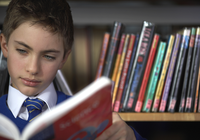
The latest research shows that there is a consistent protective association between time outdoors and becoming short sighted. It is predicted that half the world will become myopic by 2050.
Brien Holden Vision Institute urges parents and teachers to act now,” added Professor Naidoo. "Parents should encourage their children to spend time outdoors for at least two hours each day. They should also ensure children don’t spend too much time on electronic devices, such as tablets, mobile phones, electronic games, television and other activities which requires them to focus close up for long periods. Teachers and parents should ensure that children are screened for vision problems at regular intervals and can also be vigilant in detecting and acting on vision problems among children.”
BHVI researchers predicted that nearly five billion people will be myopic by 2050, with up to one billion having high myopia and at significantly increased risk of blindness, if behavioural interventions and optical treatments are not developed and implemented.
Last year a University of Ulster study revealed that nearly one-quarter of British children aged 12 and 13 years had been diagnosed with myopia. This compared with a reported incidence of myopia of 10 per cent in the 1960s.
Another published study by a Melbourne ophthalmologist found that an extra 40 minutes of outside activity per day over three years led to a 23 per cent reduction in the rate of myopia in six-year-old Chinese children.
The study, by Professor of Ophthalmic Epidemiology at the University of Melbourne, Professor Mingguang He from the Centre for Eye Research Australia, was published in the Journal of the American Medical Association.
The researchers said myopia had reached epidemic levels in parts of East and Southeast Asia. Young adults here were being increasingly affected, with 80 to 90 per cent of high school graduates diagnosed and 20 per cent of these having high myopia (equal to or less than -6 dioptres.)
While the exact link between time spent outdoors and better eyesight remains unclear, Professor He and his colleagues propose that this might involve increased dopamine release from the retina, stimulated by brighter light outdoor.
‘School-based initiatives could include even more time for classes outdoors, for example using school recesses to get children outdoors, encouraging parents to bring their children outdoors at weekends, or using new classroom design to provide higher indoor light intensities,’ he said.
Another new study, in identical twins, also confirmed known environmental risk factors for myopia. It found that twins who spent more time outdoors or performed more outdoor sports were less likely to be myopic than their twin who performed more close work.
Twins who spent more time outdoors or performed more outdoor sports in both age groups were less likely to be myopic than their twin.
The study suggests differences in lifestyles before 25 years of age have a sustained effect, reflected in twin subjects’ vision over 30 years later,’ the researchers said.
So there is emerging evidence that the association in close work, time outside and outdoor sport are an important influence in vision.
